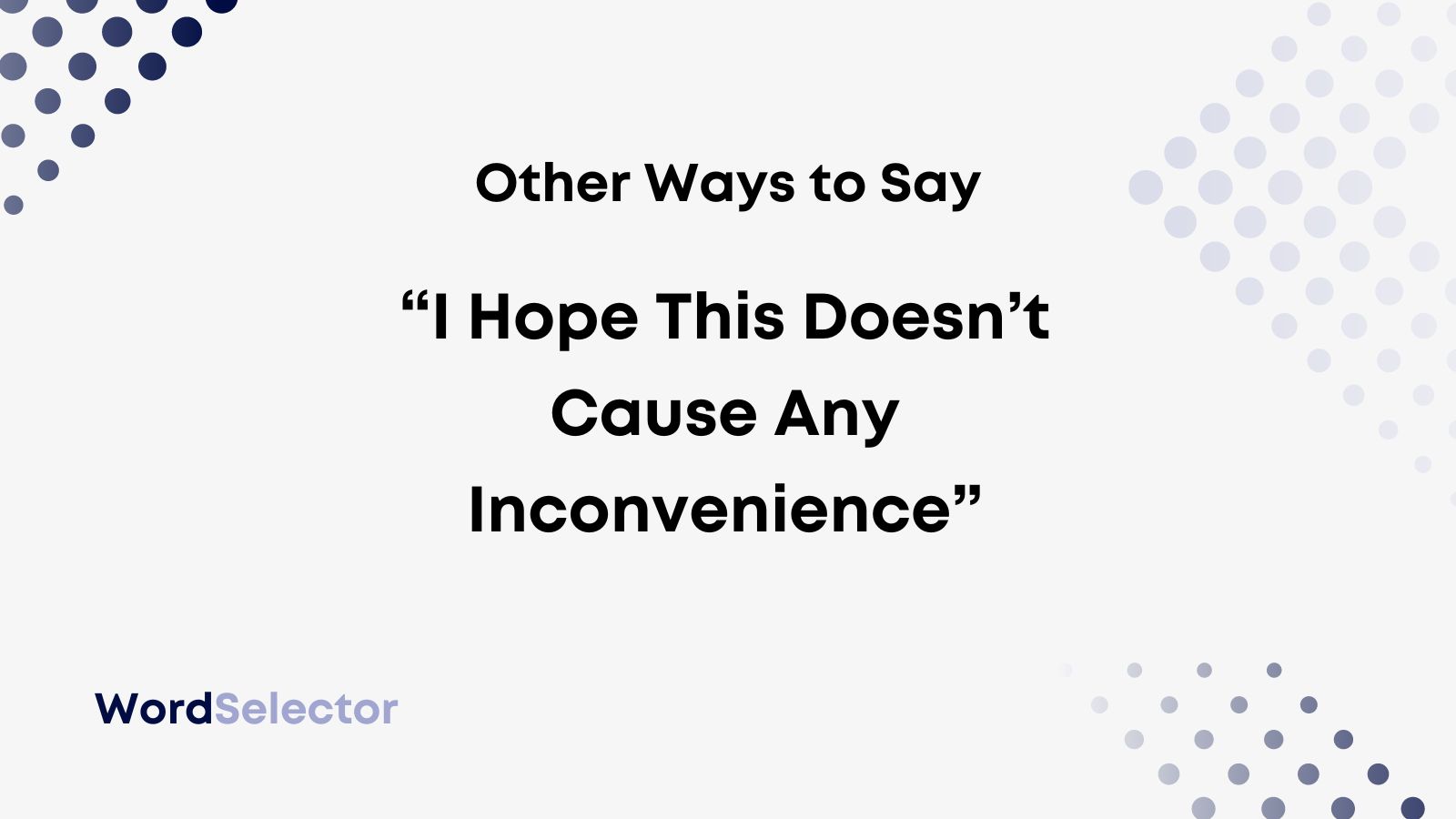“I hope this doesn’t cause any inconvenience” is a bit overused in professional emails. That’s why you’re here, right? You want to find a different phrase that works better.
Well, this article will share the best synonyms out there. There are some great choices that work well.
Other Ways to Say “I Hope This Doesn’t Cause Any Inconvenience”
- Please forgive any issues this might cause
- I don’t want to cause trouble
- I hope you don’t mind me saying
- Let me know if any issues arise
- I hope this will not cause any problems
- I hope this does not cause too much trouble
- Please tell me if this is too much of a problem
- I hope I didn’t cause you any trouble
- I pray this doesn’t cause you any trouble
- If you experience any problems, let me know
KEY TAKEAWAYS
- “I hope this doesn’t cause any inconvenience” is one of the best ways to apologize for a problem formally.
- You could say “please forgive any issues this might cause” if you want a professional alternative.
- “I don’t want to cause trouble” is useful in conversational situations.
Keep reading to learn more about the best phrases and synonyms. We’ve talked more about the best options in formal and informal situations to help you.
You might also benefit from learning more about “I hope this doesn’t cause any inconvenience.” The final section is dedicated to helping you understand how it works.
Please Forgive Any Issues This Might Cause (Formal)
“Please forgive any issues this might cause” is a great formal alternative. You can use it instead of “I hope this doesn’t cause any inconvenience” when you’re worried that you might offend someone by causing them problems.
For example, it’s good to use when emailing your boss and telling them that you need to write a complaint. If you have a good working relationship with your boss, you might feel bad about the complaint because you know it’s extra work for them.
Alternatively, you may use the phrase when letting customers know that you’ve had to close early or change your opening hours. It tells them that the changes are out of your control and you appreciate the difficulty that might come with it.
We recommend using both “please forgive any issues this might cause” and “I hope this doesn’t cause any inconvenience” in professional contexts. You should switch between the two when mixing up your writing.
These email examples will demonstrate more about it:
Dear Adam,
I have to write a complaint about their performance. I do not believe it’s up to par with company standards.
Please forgive any issues this might cause.
Yours,
Adrian
Dear customers,
We have had to close early due to staff shortages. Please forgive any issues this might cause.
All the best,
The Green Co.
I Don’t Want to Cause Trouble (Informal)
“I don’t want to cause trouble” is a great informal synonym. It’s very conversational, meaning you won’t often find it in email contexts. It’s much better to include it in text messages.
You may have luck with this phrase when messaging friends. If you’ve had to deliver some bad news, “I don’t want to cause trouble” shows that you regret doing so. It implies you didn’t know what else to do, and telling them was your last resort.
We don’t recommend using “I don’t want to cause trouble” formally. It’s not very professional. You should stick with “I hope this doesn’t cause any inconvenience” when you want to sound more formal.
You can check out the following examples to see how it works:
Look, I don’t want to cause trouble, but I think you need to know what’s happening. Things aren’t looking good.
Of course, I don’t want to cause trouble. However, we need to find common ground here.
Is It Correct to Say “I Hope This Doesn’t Cause Any Inconvenience”?
“I hope this doesn’t cause any inconvenience” is correct. You should use it formally when you want to apologize for potentially wasting someone’s time.
It’s a very common professional phrase used in many mediums. You’ll often see it in emails when someone has done something that might add more work to your normal day. It shows the sender is apologetic for messing things up.
It’s also common for stores to post this phrase to customers when they’ve had to change their opening hours. If something has gotten in the way of usual operating hours, it will cause an “inconvenience,” so it’s good practice to apologize for it.
Here are a few other variations you can also use:
- I hope this delay doesn’t cause you any inconvenience
- I hope this doesn’t cause any inconvenience to you
- Hope this is not an inconvenience
You should only ever keep “inconvenience” singular, though. There is never a reason to add an “-s” to the end (making the plural form). For instance:
- Correct: I hope this doesn’t cause any inconvenience.
- Incorrect: I hope this doesn’t cause any inconveniences.
You should bookmark this page to remind yourself of the best synonyms. Then, you’ll always have a good choice to use that might help spice things up.

